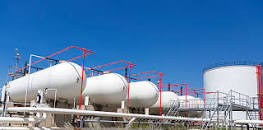- 7264
- 0
Sharing Ideas and Updates on LPG in Nigeria and related information to enable effective collaboration within the LPG Value Chain
Exploring The Nigerian LPG Industry: Prospects, Challenges, And International Market Potential.

The Nigerian LPG (Liquefied Petroleum Gas) industry has witnessed significant growth in recent years, driven by increasing domestic demand and efforts to promote clean energy alternatives. As the country strives to meet its energy needs and reduce reliance on traditional fuels, exploring the international market for LPG presents both opportunities and challenges. Let’s look into the current state of the Nigerian LPG industry, highlight its potential benefits and drawbacks, and discuss strategies to tap into the international market.
Prospects of the Nigerian LPG Industry
Clean Energy Transition: LPG offers a cleaner-burning fuel alternative compared to traditional solid fuels such as firewood or charcoal. Encouraging its use can contribute to reducing indoor air pollution and deforestation, while promoting a cleaner environment and better health outcomes.Energy Access and Affordability: LPG provides an affordable energy option for households, especially those in remote areas without access to the national electricity grid. Expanding LPG availability can enhance energy access and improve the quality of life for millions of Nigerians.Economic Benefits: Developing the LPG sector can spur economic growth, generate employment opportunities, and attract investment. The establishment of LPG infrastructure, including storage facilities, distribution networks, and retail outlets, creates a robust value chain that contributes to the overall economy.
Challenges and Limitations
Infrastructure Deficit: The Nigerian LPG industry faces significant challenges related to infrastructure, including inadequate storage and distribution facilities. Insufficient infrastructure limits the country's capacity for large-scale production and affects the accessibility and affordability of LPG for consumers.Safety Concerns: Safety remains a critical concern in the LPG industry. Accidents related to improper handling, storage, and transportation of LPG can have severe consequences. Addressing safety issues through stringent regulations, training, and public awareness campaigns is crucial for the sustainable growth of the industry.Market Penetration: Despite the growing domestic demand, Nigeria's LPG industry still lags behind its full potential. Limited consumer awareness, affordability constraints, and a preference for traditional fuels hinder market penetration. Educating the public about the benefits of LPG and implementing targeted subsidy programs can help overcome these barriers.
Tapping into the International Market Potential
Policy Support: The Nigerian government should provide an enabling policy environment that promotes investment in the LPG sector. Policies aimed at reducing importation costs, creating favorable tax regimes, and streamlining licensing processes can attract both local and international players.Infrastructure Development: Enhancing the LPG infrastructure network is crucial for accessing international markets. Investment in storage terminals, bottling plants, and transportation infrastructure can improve supply chain efficiency, enable export capabilities, and increase competitiveness.Market Diversification: Exploring international markets requires diversifying product offerings beyond the domestic market. Developing specialized LPG derivatives, such as propane and butane, and establishing strategic partnerships with international buyers can open up new avenues for export.International Collaboration: Collaborating with international organizations and industry associations can facilitate knowledge transfer, capacity building, and best practice sharing. Engaging in dialogues and participating in global LPG conferences and exhibitions can help showcase Nigeria's potential and attract foreign investments.
The Nigerian LPG industry holds immense promise for clean energy transition, economic development, and improved energy access. To harness the full potential of the industry, addressing infrastructure challenges, prioritizing safety measures, and promoting market penetration are essential. Additionally, tapping into the international market requires supportive policies, robust infrastructure development (which we discussed last week), market diversification, and strategic collaborations. By capitalizing on its strengths and addressing existing limitations, Nigeria can position itself as a key player in the global LPG market, benefiting both the economy and the well-being of its citizens.
We value your thoughts and opinions on the topics we discuss. Regarding the current Nigerian LPG industry, we are curious to hear your perspective on its potential for international success. Do you believe the Nigerian LPG industry has the capability to thrive on the international stage? We welcome your insights and suggestions on this matter.
















0 Comment.